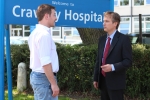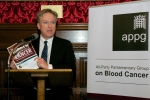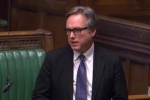
The importance of vaccines has been more apparent over the last year than any other period in living memory.
Not just for Covid-19, but now for Malaria as well. In recent days we have seen a further triumph for British science, with approval for a life-saving UK Malaria vaccine to be rolled out in sub-Saharan Africa, which will provide a huge boost in protecting millions of children from this disease.
In Britain, as we continue our recovery from the pandemic, it is the Covid-19 vaccine which has ensured the growth of the UK economy during the second quarter of 2021. But while tackling coronavirus has been crucial over the last two years it cannot be the sole focus of Government.
Last week the Health & Social Care secretary spoke about the necessity to get the NHS waiting list down. This is a cause I have been pursuing particularly as a supporter of the Catch Up With Cancer campaign.
The campaign is calling for action to address the Covid-induced backlog in cancer care. Crawley of course houses several leading manufacturers whose radiotherapy scanners play an important role in improving oncology patient outcomes.
I welcome the announcement of 40 new Community Diagnostic Centres to be established at sites across the country. These will provide a one-stop-shop for key testing to boost early diagnoses, and speed up and increase referrals. The Centres are to provide a full range of scans and tests to patients to catch illnesses at the earliest signs; not only increasing NHS capacity but also saving lives as our health service continues to tackle the historic elective backlog caused by the pandemic.
While the pandemic has meant that many people with health concerns have not come forward for checks and scans, non-urgent procedures were also postponed to allow the NHS to focus on coronavirus. Boosting diagnostic services is vital in supporting the NHS to catch up, and as Chair of the Blood Cancer All-Party Parliamentary Group I have been clear that there needs to be an enhanced focus on early diagnosis as this can lead to far greater patient outcomes.
I have also called for the NHS to be freed from unnecessary bureaucracy. The Health & Social Care Secretary has acknowledged that while NHS leadership is a big driver of performance, not enough is done to foster the best performance, which means patients do not always get the care they deserve.
A far-reaching review of the leadership and management of health and social care in the UK, to be led by General Sir Gordon Messenger, former Vice Chief of the Defence Staff, will see a move towards an approach which furthers not only the power but the freedom of health and care leaders to drive change forward.
Henry Smith MP




